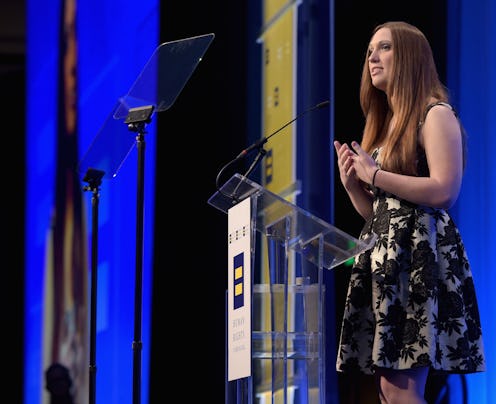News
What Coming Out Taught This Trans Activist About Her Own Privilege

Last summer at the Democratic National Convention in Philadelphia, Sarah McBride made history as the first transgender America to speak at a major U.S. political party's convention. But just four years before McBride's landmark speech, she had her own personal history-making moment. Back in 2012, right after completing her term as the student government president of American University, McBride came out as trans to her classmates — and this, too, made national news.
Now the National Press Secretary of the Human Rights Campaign, McBride tells Bustle how coming out helped her become the leader she is today.
While she was already actively involved on campus in fighting for LGBTQ rights, it wasn't until she published a column titled "The Real Me" in the American University student paper, The Eagle, that McBride was able to share her transgender identity with all of her peers. (She had come out to her family a few months earlier in Christmas of 2011.) In that piece, she wrote:
With everything I did, from the mundane to the exciting, the only way I was able to enjoy it was if I re-imagined doing it as a girl. My life was passing me by, and I was done wasting it as someone I wasn’t.
McBride tells Bustle that it was the position of leadership and influence that helped push her to become public about her gender identity.
"When I went to college, I was a student body president, and I think it was the first taste of being able to impact my community," McBride says. "It made me realize that the things I told myself would make me feel whole, make me feel well, weren’t enough if I was hiding."
She also says she felt a stronger urge to come out as she became more immersed in the pervasive issues of housing discrimination against the LGBTQ community, as well as the myriad other forms of institutionalized oppression. "The issues of inequality and injustice for LGBTQ people only highlighted my internal struggle even more," McBride says. "It was through those insights and the courage that the role gave me, that I was able to grapple with myself and eventually tell my family and the broader community."
"Coming out as a transgender American and having my family love and embrace me, that is not a reality for everyone," McBride says. "So actually, it was that experience that made me say, 'Whoa, the privileges that I have aren’t a reality for everyone.'"
However, McBride says that as much as she was fueled by her activism goals, coming out ultimately felt less like a choice and more like a necessity. "I think it's also important to note that it’s not a rational feeling," McBride says of her desire to come out. Rather, she explains, "it’s one of survival.
"I had this constant feeling of homesickness in the pit of my stomach that would not go away — until I could be seen and affirmed as myself. That pain was only growing with time and I needed to alleviate that pain. I didn’t want to look back 60-70 years from now and regret not doing that," she says.
"We have so many LGBTQ people who live in deep red states, whose only hope of protections is through Republican elected officials, or colleagues and coworkers and neighbors. So, we need to be talking to everyone, everyone is a potential supporter of equality."
For McBride, coming out was a wholly positive experience, with her family and loved ones fully supporting her. However, she also realizes that such a coming out experience isn't the case for everyone — and she wants to fight to make sure others can have the support she did.
"Coming out as a transgender American and having my family love and embrace me, that is not a reality for everyone," McBride says. "So actually, it was that experience that made me say, 'Whoa, the privileges that I have aren’t a reality for everyone.'"
After having these realizations, McBride has been hard at work advocating for the LGBTQ community.
"We have so many LGBTQ people who live in deep red states, whose only hope of protections is through Republican elected officials, or colleagues and coworkers and neighbors. So, we need to be talking to everyone, everyone is a potential supporter of equality," says McBride. "We have to remain committed."